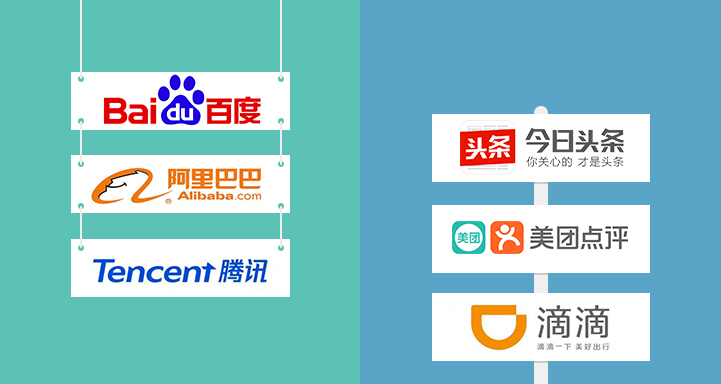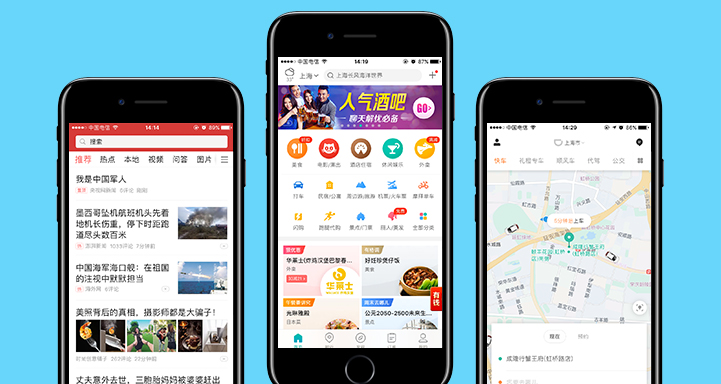Last Updated on May 25, 2023
China is already more digitized than many spectators realize with one of the most active digital-investment and start-up ecosystems in the world. “Ecosystem” is a word that gets thrown around a lot in the tech industry, but this buzzword actually deserves a lot of attention. The digital tech rise in China has appeared to grow from overnight but far from inexplicable. Sectors that once seemed isolated fit together smoothly where users, their data, and businesses are all interconnected. China is one of the world’s largest adopters of digital technologies, and home to one-third of the world’s unicorns. At present, China has given birth to its next generation of tech giants, like Toutiao, Didi Chuxing and Meituan-Dianping (TMD).
BAT China
Anyone who is interested in the IT industry in China would probably be familiar with the Chinese tech trinity— Baidu, Alibaba, and Tencent, or BAT as they are collectively known—have created a multifaceted and multi-industry digital ecosystem that has touched almost every aspect of the digital world. Together, these three companies have from 500 million to 900 million active monthly users in their individual sectors. The big three have grown far beyond their core businesses and are now using their positions to further strengthen the nation’s digital ecosystem. Alibaba, Baidu, and Tencent together fund 30% of China’s top start-ups, such as Toutiao, Didi Chuxing and Meituan-Dianping (TMD).

TMD Shanghai
Now China has given birth to its next generation of tech giants, born in the digital age where there seems to be an infinite amount of ways to reshape the digital market. Some of the world’s most valuable tech startups now include three new tech giants: news app Toutiao, group-buying service Meituan-Dianping, and ride-hailing firm Didi Chuxing. The three unicorns, together known as TMD.
Toutiao
Toutiao, meaning “headlines” in Chinese, is a wildly popular Chinese news aggregation app. Toutiao brings in 120 million daily active users, each of whom spends an average of 74 minutes per day using the platform. The platform is comparable to Google News, but a bit more advanced and user-focused. The platform uses advanced algorithms to push content to users based upon their reading habits and users are able to tailor their feed to their unique interests. The platform partnered with Buzzfeed, and added select content from the popular Western media company that is now integrated into Toutiao’s feed. Additionally, the news aggregator has bought into the short video trend, creating two of its own short-video platforms.
Meituan-Dianping
Meituan, which was valued at $30 billion in a fundraising round, is China’s largest platform for lifestyle services and products ordered through smartphones. The Beijing-based company provides a wide range of local services; you can purchase deals for restaurants, order food delivery, book a hotel room, and order a taxi service. With this broad reach, Meituan is evolving into an all-in-one consumer services destination that is starting to rival Tencent’s WeChat. Besides food delivery, Meituan founded Maoyan, a movie ticketing App, further increasing its digital reach. Meituan has also invested in at least 14 other startups, and spent $2.7 billion on Mobike investments.
Didi Chuxing
The Chinese ride-hailing giant established in 2015 through a merger of Tencent-backed Didi and Alibaba-backed Kuaidi, growing to a valuation upwards of $20 billion. The company isn\’t just cars and taxis. Didi also offers services with buses and even has an option to book chauffeurs. Didi is continuously expanding into transport areas including car rentals, electric vehicles and on-demand bike services. The company recently launched a bike-sharing platform within its app providing services partnering with Ofo, and is planning to roll out a bike-sharing brand of its own. Food delivery and artificial intelligence are other sectors that Didi is looking to take part in. Didi has also increased its global reach and invested in 17 other companies including, Middle Eastern ridesharing platform Careem and Singapore’s Grab.

China BAT and TMD Impact on Brands
For quite a while, brands operating in China have worked with third-party digital agencies in order to localize their branding and marketing promotions. Chinese tech giants are now improving the precision of these marketing campaigns by adopting the new “Social+” model where different industries are anchored by a social pillar that drives user engagement and growth. Social+, a model unique to China, comes in the shape of millions of active users amassed in a relatively short period of time, which can spark serious growth for new brands.
This integrated model allows tech giants to keep track of users’ data, buying and paying behaviors from every step of way. By combining massive data assets, businesses can identify, segment and build tailored content for the best possible outcome. In this way, brands can quickly gain and increase customer loyalty. Take Toutiao, for example, can provide more flexibility and variety to a brands marketing strategy by placing advertisements or releasing advertorials on the platform, which would be an excellent alternative for tailored brand exposure.

The unique dynamics of the Chinese market is enabling rapid expansion of digital business models on a large scale. With the help of AI and big data, these companies are creating ecosystems that allow users to access all kinds of products and services through a single entry point. This new dynamic has a huge list of opportunities for digital marketing and brands outside of China. The TMD ecosystem aims to bring innovation and soundness to the digital marketing industry, assisting brands to create better engagement with consumers and increase outreach. The continued movements of these tech giants into other verticals will continue to rattle the digital ecosystem and create innovative branding solutions for companies entering the Chinese market.

